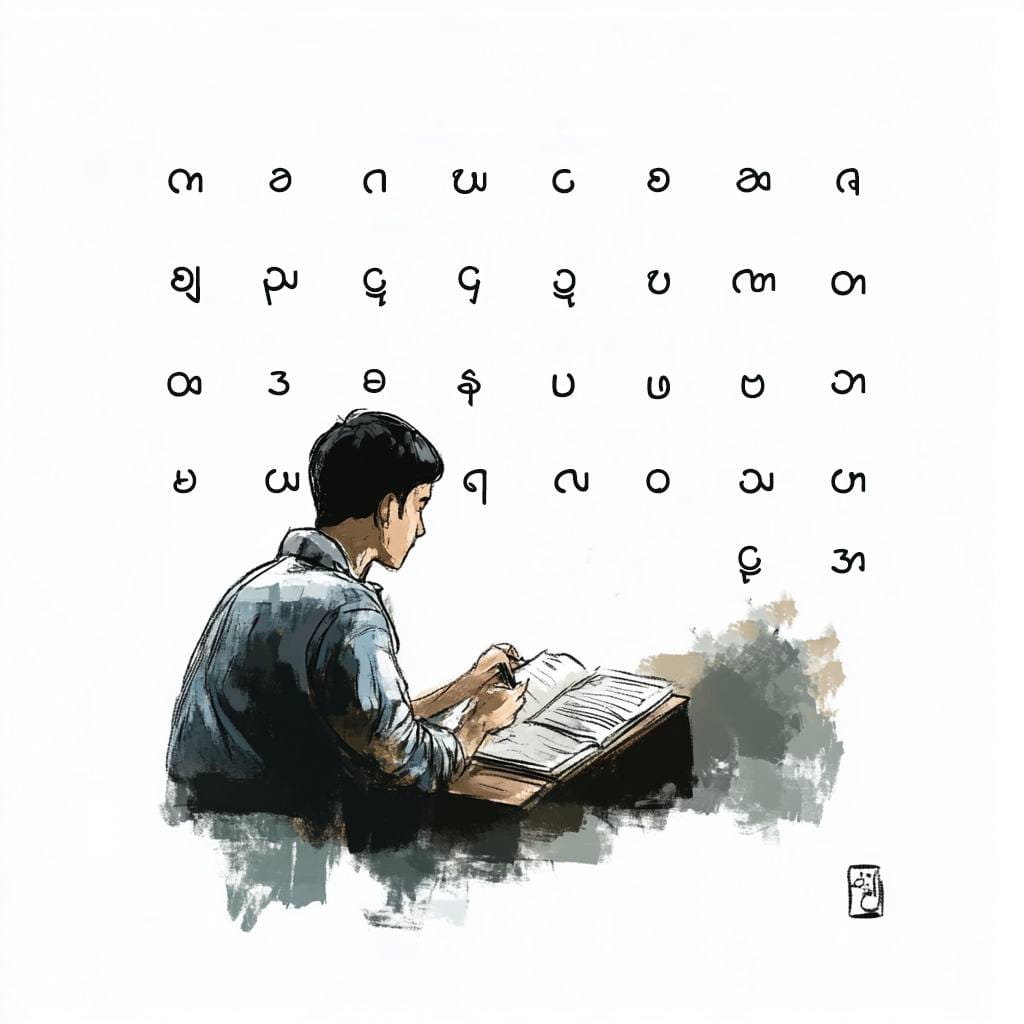
Western people invented computers. They also created English fonts that could be used with computers. So who invented Burmese fonts for the Myanmar people?
The Zawgyi font was invented by U Ye Myat Thu, an entrepreneur. However, many fonts appeared before Zawgyi. The question is, who was the first to make it possible to type Burmese on a computer?
There was a scholar in the field of Burmese literature who invented the first computer-compatible Burmese font, focused on Burmese language education for 60 years, and taught Burmese persistently until just before his death.
Such a scholar existed in the world of Burmese literature
Interestingly, he was neither from Myanmar nor a Myanmar citizen. This scholar was John Okell. His friends called him Ko Hla Thein. Some also called him Ko Oke Kell, a phonetic play on his surname.
In the field of Burmese literature, there have been foreign scholars who contributed to Burmese literature, like J.S. Furnivall and Professor Luce. Among these distinguished individuals, John Okell can be said to have made his own unique contribution to Burmese literature.
John Okell was born in 1934 in Brighton, southern England. As an adult, he studied Roman and Greek classics at King's College, Oxford University.
Around 1959, at the age of 25, he studied Burmese literature at the School of Oriental and African Studies (SOAS), University of London. His teacher at that time was the famous Burmese teacher, Dr. Hla Pe. He also studied linguistics there. While studying Burmese literature, he became quite interested in Burmese cultural customs.
In 1960, he came to Myanmar. Although 1960 Myanmar was a time of political complexity, people were educated. Historically excellent individuals were still alive in Myanmar at that time. However, John Okell's efforts to study Burmese and learn about Myanmar culture in Yangon did not yield as much as he had hoped.
Were the Burmese of that era speaking English extensively? So, to study Burmese, he traveled up to Mandalay, which was overflowing with Burmese culture. Coming to Mandalay turned out to be quite the right decision for him.
Why? Because in Mandalay, he met U Maung Maung Tin, a lecturer in Burmese, and Dr. Than Tun, a professor of history. He learned about Burmese language and culture from these scholars.
Moreover, he met weavers from Amarapura, farmers from Shwebo, and Burmese theater troupes. Since they only spoke Burmese, it was quite convenient for him, who wanted to study Burmese culture.
In Mandalay, he also got to know renowned scholars like Saya Zawgyi, Min Thu Wun, Dr. Tha Hla, and Dr. Nyi Nyi. Similarly, he became acquainted with famous young writers of that era like Tin Moe and Maung Swan Yi. So, for him, who was eagerly studying Burmese language and culture, it was quite favorable.
After living in Myanmar for about a year, studying Burmese, he returned to England. Later, he wrote about his journey of studying and teaching Burmese during his 1960 Myanmar trip in the 2006 Myanmar Studies Bulletin.
When John Okell returned to England, he became a Burmese language teacher at SOAS. In addition, he taught Burmese to the British diplomatic circle related to Myanmar.
In 1969, he came back to Myanmar. He studied Burmese for another year. This time, he went up to Mandalay and studied at famous monastic schools in Myanmar like the Mahagandayon Monastery and the Masoyein Monastery.
John Okell wasn't just ordinarily interested in Burmese. He was also a scholar who combined Burmese with research. While Myanmar people might easily say they know Burmese when asked, they don't understand the complexities and depths of the Burmese language in a scholarly manner. Similarly, Burmese language teachers don't teach with linguistic methods as in other countries. They can only teach Burmese in a way that a Myanmar person can understand. In fact, to put it simply, even among Myanmar scholars, those who can teach systematically using linguistic methods are rare. To fill this gap, John Okell approached Burmese language from a linguistic perspective and published research papers on Burmese language.
Some of the books John Okell wrote include:
- Burmese (Myanmar): An Introduction to the Literary Style
- Burmese (Myanmar): An Introduction to the Spoken Language Book 1
- Burmese (Myanmar): An Introduction to the Spoken Language Book 2
- A Reference Grammar of Colloquial Burmese 1
- A Reference Grammar of Colloquial Burmese 2
As John Okell was interested in linguistics, he wrote research papers related to the Burmese language as well as textbooks and curricula for teaching Burmese. He also compiled a textbook on teaching methods for Myanmar classical music with Myanmar teachers.
Thanks to John Okell's contributions, non-Myanmar foreigners were able to systematically study and learn Burmese. Especially for diplomats, INGOs, and foreign students studying Burmese who were engaged in international interactions, John Okell became a pioneer in Burmese language education.
As mentioned at the beginning of the article, John Okell was also the inventor of the precursor to today's computer Burmese fonts. He is known as the inventor of the Burmese Innwa font, called Avalaser. A book was printed with his font by the Mandalay Ludu Press in 1990. That book was "Short Stories Loved by Children and Adults" by the famous writer Nyi Pu Lay. This became the second book typeset by computer in Myanmar.
Before that, in 1985, the Rohwedder company in Hamburg, Germany, first invented the Burmese computer keyboard with the help of Myanmar government expert U Aung Myint, according to records.
John Okell's font, however, is well-known. As he was also close to the famous writer Ludu Daw Amar, the development of the Avalaser font became more accessible.
John Okell also served as the Burmese language supervisor and evaluator for BBC, VOA, and RFA media at one time. He strived throughout his life to enable non-Myanmar foreigners to learn Burmese. John Okell was also the chairman of the Britain-Myanmar Society. Therefore, his role in British-Myanmar relations was important. For this reason, he was awarded the OBE by the British Queen in 2014. In 2016, he was awarded an honorary doctorate by the University of London for his achievements.
John Okell started working as an assistant lecturer in linguistics in 1959 and retired at the age of 65. However, he did not stop his journey of teaching Burmese literature and persistently continued teaching Burmese to foreign students.
After retirement, he also taught Burmese in Chiang Mai, Thailand, for quite a few years. From 2009 to 2020, he continuously taught Burmese for 11 years. John Okell was indispensable in the Burmese language education programs of the British Embassy in Myanmar. He was also highly respected among scholars.
Even during the COVID-19 pandemic, he conducted Burmese language education via Zoom. He only stopped teaching two months before his death when his illness became severe.
John Okell, or the great benefactor to the Burmese people who had persistently taught Burmese literature for about 60 years, passed away on August 3, 2020. He was 86 years old when he died.
At the time of John Okell's death, his students from around the world, trainees, the British diplomatic circle, and the INGO community expressed their grief.
Now, it has been 4 years since John Okell's passing. Those who love Burmese literature still remember John Okell's contributions to the Burmese language.
Han Thit Eain (Y3A)
Read More:
 Build Myanmar - MediaY3A
Build Myanmar - MediaY3A
 Build Myanmar - MediaY3A
Build Myanmar - MediaY3A
Build Myanmar-Media : Insights | Empowering Myanmar Youth, Culture, and Innovation
Build Myanmar-Media Insights brings you in-depth articles that cover the intersection of Myanmar’s rich culture, youth empowerment, and the latest developments in technology and business.
Sign up for Build Myanmar - Media
Myanmar's leading Media Brand focusing on rebuilding Myanmar. We cover emerging tech, youth development and market insights.
No spam. Unsubscribe anytime.
Sign up now to get the latest insights directly to your mailbox from the Myanmar's No.1 Tech and Business media source.
📅 New content every week, featuring stories that connect Myanmar’s heritage with its future.
📰 Explore more:
- Website: https://www.buildmyanmarmedia.com/
- Facebook: https://www.facebook.com/buildmyanmar
- YouTube: https://youtube.com/@buildmyanmarmedia
- Telegram: https://t.me/+6_0G6CLwrwMwZTIx
- Inquiry: info@buildmyanmar.org
#BuildMyanmarNews #DailyNewsMyanmar #MyanmarUpdates #MyanmarNews #BuildMyanmarMedia #MyanmarNews #GlobalNews #TechNewsMyanmar #BusinessNewsMyanmar #Updates #Insights #Media
